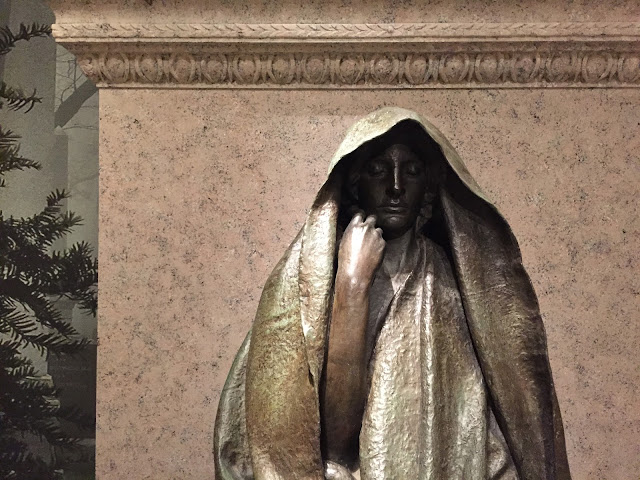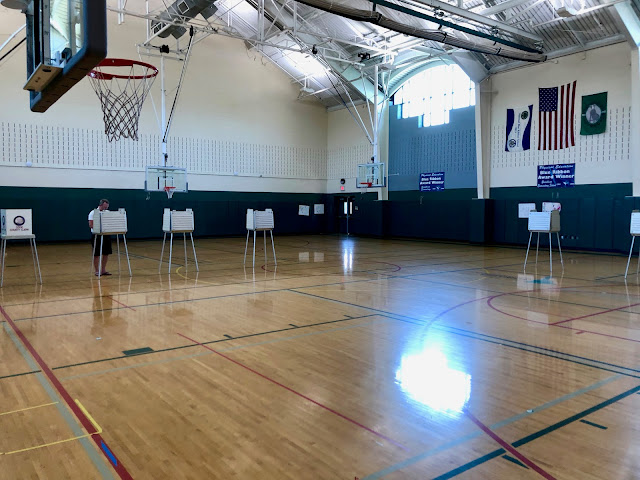My 10th year of writing Every Goddamn Day begins Friday, and this is my annual pause to review the blogical year now past. I've looked back at the form, and these annual reports seem to have become occasions for public whining about fatigue and carping about obscurity. The good news is that I'm not doing that this year. At least I'll try to keep it to a bare minimum. EGD is not a burden, it's a benefit, not a flaw, but a feature of my life, a valued feature. I'm glad for the chance to do it. It's an oar in the water, a dog in the race, albeit a very small, very slow dog loping along far behind the bounding pack.
Whoops, it's so easy to slip. But that's just candor. I can't pretend this is rattling the windows. That isn't my brand. I honestly think existing under the radar is a good thing, as illustrated by the single post this year that achieved what I consider a hint of the social media shock waves enjoyed by the big dogs:
June 8's constitutional analysis, and that got notice only because the headline mentions child porn, and that caught the attention of toxic screamers, who excited their groundlings. When I first noticed the tweet had 120 comments I reflexively cried out, "Oh no!" Within hours it reached 10,000 comments. I was steely-eyed, determined, locked in; I didn't read one, which took resolve, but was smart strategy, as I will explain. Keep the poison out. Besides, certain plants grow best in the dark, and I'm one of them. Or so I tell myself.
The big news of the past year is that in May I finally finished the book that this blog inspired, "Every Goddamn Day: A Highly Selective, Definitely Opinionated, and Alternatingly Humorous and Heartbreaking Historical Tour of Chicago" (yes, I know. I think it's a search engine optimization thing, or a Victorian exuberance which crops up now and then in publishing. The title originally was even longer, but I implored them to chop a little.)
When I turned the manuscript in to the University of Chicago Press, I told my editor, sincerely, that the book was so much fun to research, so
interesting to write, that I didn't care whether they publish it or not. That might sound strange, but it was sincere. I'm at a point in my career when whatever eyebrow twitch or stifled yawn my work extracts from the public can't be the reward. The reward has to be the doing. You rarely hear a writer say he
likes to write, and it might be a sign of hackdom, but so be it. It's true.
Well, except for copyediting and proofreading the galleys, which was an exhausting grind. And terrifying, given the errors I managed to pluck out at the last moment. I hope that I don't spend its publication in October in a kind of miserable crouch, waiting for the assorted typos and factual errors to come pelting down on my back, like hot ash from Mount Vesuvius. I won't be surprised though.
But that's ahead. In the past year, EGD has gone to some interesting places, and I appreciate you tagging along. The monthly highlights:
 |
| Edith Renfrow Smith |
In July, 2021,
we met Edith Renfrow Smith in advance of her 107th birthday. A reminder of the importance of just going. I had no idea of her history, and was merely tagging along with a reader who invited me to meet a really old friend. Then she started talking about being the first Black graduate of Grinnell College and Herbie Hancock teaching her daughter to play "Chopsticks' (it also was a reminder to do your homework, which I hadn't). I was pleased that Hancock not only gave me a quote, but called Smith on her birthday.
In August we popped in on
S. Rosen's to watch them make buns, and learned about how COVID affected even the production of bready hot dog wrappings.
All year of course I kept pouring water on the Trump flare-ups still threatening to burn down democracy. In September, I reminded everyone that for all the grimness associated with "1984," from the perspective of today,
George Orwell was an optimist. Nothing seemed to diminish the monstrosity, but that doesn't free any of us from the obligation of trying.
In October, I challenged myself to find a fresh take on that hoary chestnut of Chicago history,
the Great Chicago Fire, to mark its 150th anniversary, and believe I succeeded, starting with Mary Todd Lincoln, the president's widow, who was living in Chicago at the time of the fire.
In November, we paused after a Trump stalking horse won in Virginia to savor the ululations of his minions in
"A word from Scut Farkus and friends."
In December, we looked to the past, as preview of the social disaster that was indeed coming when the Supreme Court would reverse Roe v. Wade half a year later in
"Pro-Choice Priests and Suicide Girls." |
| Peanut butter |
January kicked off 2022 with photographer Ashlee Rezin and me in the COVID intensive care unit at Roseland Community Hospital, tracking the front line medical battle against the Omicron variant. While some commentators indulged in false hope, on Feb. 15, nine days before the tanks rolled across the border, we explained "
Why Russia is about to invade Ukraine." In March, I accompanied Thresholds as they
treated the mentally ill on the streets of Chicago. April saw a
farewell to my friend Lee Flaherty, founder of the Chicago Marathon. May saw one of my patented attempts to praise a product, in this case,
why Smucker's Natural Peanut Butter tastes so good, turn into a far funnier study of corporate incompetence.
Which leads us to the month now ending. I can't overlook my
Neenah manhole cover story, which took years to set up, and got solid reaction and big front page treatment. Then there was the headline that blew up on Twitter,
"Why restrict child porn but not guns?" If you read the piece, you see it's a sober legal juxtaposing the 1st and 2nd Amendments. But the Twitter mob doesn't read the actual articles, that would delay their simply melting into bubbling pools of indignant hysteria. But I refused to feed the trolls, and was rewarded by the entire kerfuffle utterly vanishing in about three days, a valuable lesson to others who find themselves being raked by a Twitter enfilade. Keep your head down and just wait. Nobody really thinks you're a pedophile. Nobody is actually going to come and kill you. You can also restrict who can comment on your tweets, and I've now been doing that routinely. The post became my second most popular, with over 23,000 hits. A good thing, I guess, though I'd trade that for 2,300 people reading the column and thinking about it. No? How about 230?
Which leads us to the all-important numbers. The blog didn't seem to have the randomly generated spiderbot spikes of past years. So with 800,876 clicks for the year, that translates into an average of 66,739 readers a month, or almost 2,200 a day. Not the big leagues, but consistent. Seven months were in the 60s, two in the 50s, two in the 70s and one in the 80s.
Look, if a scoutmaster finds himself with an audience of six 7-year-olds around a campfire, he still tries to tell a good story, the best he can, and doesn't pause to shake his fist at the sky because he's not telling it to 100,000 scouts gathered at a jamboree in Soldier Field. I can do no less.
What else? The Chicago Sun-Times was purchased, for the traditional dollar, by WBEZ, the local National Public Radio outlet, and that was considered a good thing, both for the improbable lion-and-the-lamb union, and for the $60 million plus in charitable dollars doing so magically unlocked. We announced Wednesday that we're moving our downtown newsroom from Racine Avenue to the Old Post Office, which is exciting. I marked my 35th anniversary on staff in March, an astounding figure, and wrote myself onto the front page with sufficient consistency for me to entertain hopes that I won't be sacked in the coming year, the way most of the established columnists over at the Tribune have been. This was the year that writing a newspaper column felt as if it had sunk into the mock heroic, like wearing spats or being a professional luthier. It is still a job category — people write columns, just as they make violins — but not precisely a growth field. Nothing would be more encouraging than to spot a sharp young columnist making waves, but there isn't one that I can detect, either because no one wants to try, or because there are no jobs to be had if anyone did. No one seems to care, and I'm trying not to either. One day at a time.
EGD's North Shore bureau chief, Caren Jeskey, hit her mark 52 weeks in a row, providing an alternate voice to mine, an amuse bouche of caring, engaged, active, joyful enthusiasm offering a valuable counterpoint to my more languid, inert, doleful contemplation.
Marc Schulman, of Eli's Cheesecake, ran his traditional series of holiday ads, nudging EGD from a pure hobby into the realm of commercial enterprises, and for that I am truly grateful. For the ads, and for the cheesecake, which is in my freezer right now, and should be in yours. You can and should
purchase some Eli's cheesecake here. Comments after the post seemed to have dwindled, and I'm not sure why. People just don't react as much as they did. Maybe I've lost some readers to senescence. I've considered just shutting down the comments, as not worth the bother. But between half a dozen and a dozen loyal readers seem to really like commenting regularly, and I see no reason to shut them out. Not yet anyway. Thank you for your thoughtful contributions to the blog, and for the corrections.
The headline on today's post, by the way, is taken verbatim from the first line of a Charlie Kirk fundraising letter, the far right fountain of fascism suggesting that being sensitive to history and to the lives of others is somehow fatal to America — and I suppose, to his America, it is. Let's hope so. I have no illusion that the past year, or all nine years, of curious centrist exploration of Chicago and the world around us will ever resonate beyond we happy few. But you can't say I didn't try, and I appreciate you hanging around to read it.










